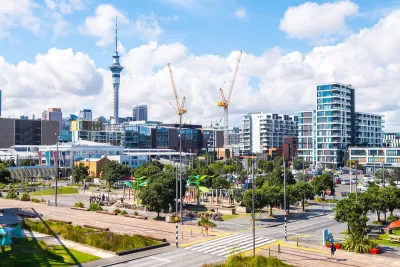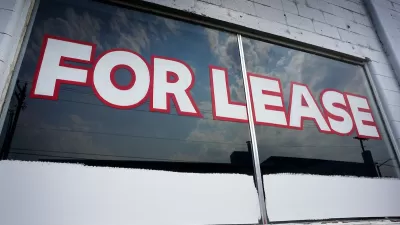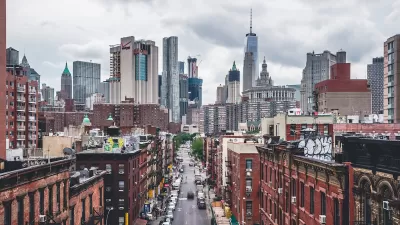New national rules will prevent local councils from limiting development in an effort to ease the nation’s housing crisis.

New Zealand plans to ease zoning restrictions to allow for more housing development, reports Charlotte Graham-McClay for the Associated Press. New legislation requires cities to free up land for development and accommodate projected growth for the next 30 years, rather than the three years required by prior regulations.
The new rules prevent local councils from imposing urban boundaries or banning mixed-use development. They will also prohibit local councils from mandating balconies, minimum sizes, and other requirements that make development more expensive.
Housing costs in the country have soared in the last two decades and remain much higher than in 2019. New Zealand renters spend a higher percentage of their income on rent than residents of any other country, according to the Organization for Economic Cooperation and Development.
Auckland, New Zealand’s largest city, saw success with a similar policy introduced in 2016, which led to a significant boost in construction and lower housing costs.
Some legislators opposed the change, saying that urban growth won’t be sustainable without additional government investment in infrastructure, and that sprawl could destroy valuable agricultural land.
FULL STORY: New Zealand will radically ease zoning rules to try to relieve its housing shortage

Trump Administration Could Effectively End Housing Voucher Program
Federal officials are eyeing major cuts to the Section 8 program that helps millions of low-income households pay rent.

Planetizen Federal Action Tracker
A weekly monitor of how Trump’s orders and actions are impacting planners and planning in America.

Ken Jennings Launches Transit Web Series
The Jeopardy champ wants you to ride public transit.

Rebuilding Smarter: How LA County Is Guiding Fire-Ravaged Communities Toward Resilience
Los Angeles County is leading a coordinated effort to help fire-impacted communities rebuild with resilience by providing recovery resources, promoting fire-wise design, and aligning reconstruction with broader sustainability and climate goals.

When Borders Blur: Regional Collaboration in Action
As regional challenges outgrow city boundaries, “When Borders Blur” explores how cross-jurisdictional collaboration can drive smarter, more resilient urban planning, sharing real-world lessons from thriving partnerships across North America.

Philadelphia Is Expanding its Network of Roundabouts
Roundabouts are widely shown to decrease traffic speed, reduce congestion, and improve efficiency.
Urban Design for Planners 1: Software Tools
This six-course series explores essential urban design concepts using open source software and equips planners with the tools they need to participate fully in the urban design process.
Planning for Universal Design
Learn the tools for implementing Universal Design in planning regulations.
Ada County Highway District
Clanton & Associates, Inc.
Jessamine County Fiscal Court
Institute for Housing and Urban Development Studies (IHS)
City of Grandview
Harvard GSD Executive Education
Toledo-Lucas County Plan Commissions
Salt Lake City
NYU Wagner Graduate School of Public Service





























